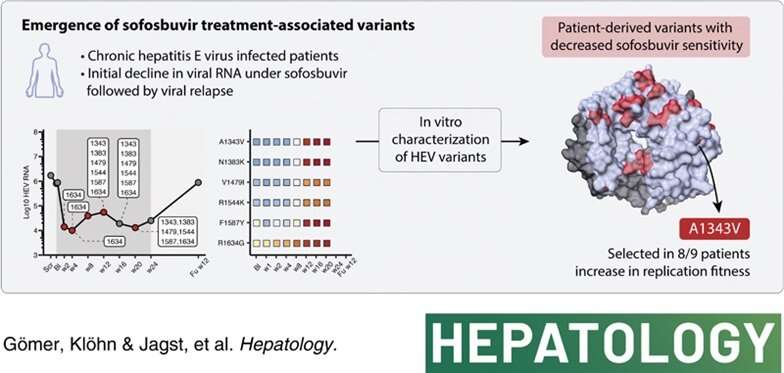This article has been reviewed according to Science X's editorial process and policies. Editors have highlighted the following attributes while ensuring the content's credibility:
fact-checked
peer-reviewed publication
trusted source
proofread
Single hepatitis E mutation renders sofosbuvir therapy ineffective

So far, there are no specific drugs to treat the hepatitis E virus. Doctors only have the broad-spectrum antiviral drug ribavirin at their disposal, which is often associated with severe side effects. Drugs against other hepatitis viruses can be used, but are often of limited help.
Why hepatitis E can escape treatment with the hepatitis C drug sofosbuvir has been discovered by a team of the junior research group "Computational Virology" around Dr. Daniel Todt from the Department of Molecular and Medical Virology at Ruhr University Bochum, Germany, together with researchers from Berlin, Hamburg and Hannover. A single mutation of the virus causes the treatment to be less effective. The researchers report this in the journal Hepatology on June 20, 2023.
Which viral variants circulate in the blood?
In an earlier clinical trial, in which the Bochum researchers were also involved, patients with chronic hepatitis E virus (HEV) infection were treated with the drug sofosbuvir, which was actually developed for the treatment of hepatitis C. "In this pilot study, we observed that treatment with sofosbuvir was initially effective," reports Dr. André Gömer.
"The amount of viral RNA initially decreased. However, it increased again during the observation period. So, the therapy did not bring the desired success," adds Mara Klöhn. The researchers analyzed samples from these patients to identify virus variants that could explain the failure of therapy with sofosbuvir. They hope this will provide new insights for future drug development.
Five-fold loss of efficacy due to a single mutation
In the retrospective analysis, they were able to identify a single mutation in the polymerase, a protein responsible for hepatitis E virus replication, called A1343V, which occurred in parallel with the resurgence of viral RNA. In laboratory experiments, the drug was shown to be five times less effective at eliminating the mutated virus than other genetic variants of the virus.
Currently, the research team is testing whether combination therapy with the standard drug ribavirin can prevent the development of the A1343V mutation, making it a promising treatment option. "For the development of future therapies against hepatitis E, we need to better understand the role of this mutation," concludes Michelle Jagst.
Todt's research group is investigating, among other things, the evolution of viruses and the interaction between virus and host cell using high-throughput sequencing and computer-assisted methods as part of its VirBio project.
Hepatitis E
The hepatitis E virus (HEV) is the main cause of acute viral hepatitis. Each year, approximately 70,000 people die from this disease. After the first documented epidemic outbreak in 1955–1956, more than 50 years passed before researchers took a closer look. Acute infections are usually self-limiting in patients with intact immune systems. In people with weakened or suppressed immune systems, such as organ transplant recipients or people infected with HIV, HEV can become chronic. HEV is also particularly threatening to pregnant women.
More information: André Gömer et al, Emergence of resistance-associated variants during sofosbuvir treatment in chronically infected hepatitis E patients, Hepatology (2023). DOI: 10.1097/HEP.0000000000000514





















